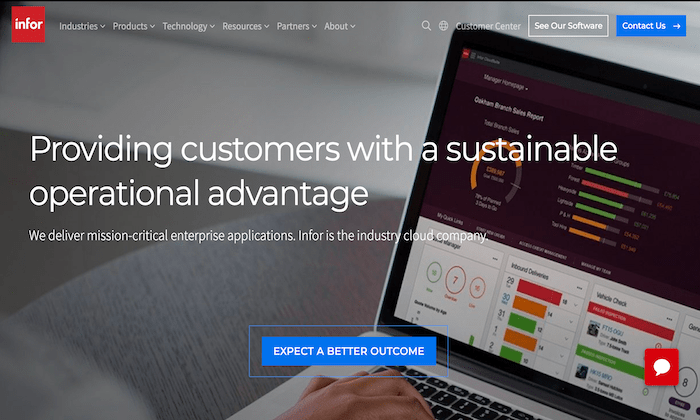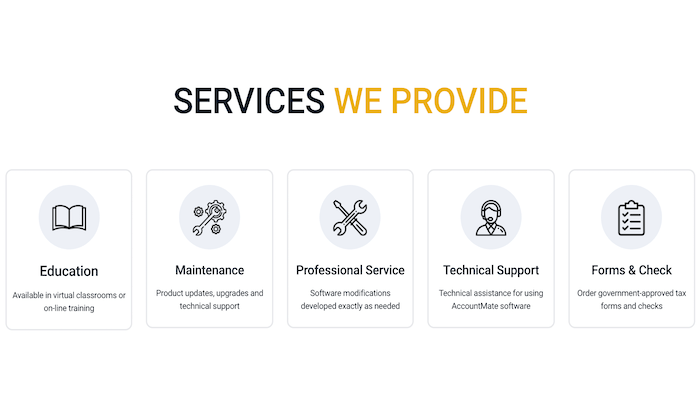
Disclosure: This content is reader-supported, which means if you click on some of our links that we may earn a commission.
Historically, ERP (enterprise resource planning) software was used by large corporations and multinational organizations for managing their entire operation from a single platform.
But now these solutions are more accessible than ever before. In addition to enterprises, lots of SMBs have started to leverage these tools over the past several years.
ERP software essentially combines all of your business tools into a centralized console. It encompasses components like accounting, HR, CRM, supply chain management, and more.
By consolidating your business tools into a single ERP solution, it’s much easier to manage. Plus, ERP software gives you tons of extra value from a big-picture point of view, that you normally wouldn’t see from standalone software.
So which ERP software is the best? Find out below.
The Top 5 Options For ERP Software
How to Choose the Best ERP Software For You
In order to find the right ERP software for your business, you need to understand what to look for as you’re shopping around. All ERP systems are not created equally, and there’s not really a “one-size-fits-all” solution.
Rather than blindingly picking a tool, use these feature sets and considerations to narrow down potential options.
Business Processes and Modules
As previously mentioned, ERP software encompasses various types of business processes. These typically come in the form of modules as you’re customizing an ERP solution.
Some of you might only need a handful of these processes, while other businesses could be looking for a dozen. It really depends on your business size, existing tools, and future goals for resource planning.
Examples of modules and processes to keep an eye out for include HRMs, financial management tools, CRM, SCM, inventory management, purchasing and supplier management, sales and marketing tools, and more.
There are even industry-specific processes for things like manufacturing or engineering. These will include crucial functionalities for product planning, production scheduling, bill of materials, shop floor planning, etc.
Make sure the ERP software you’re evaluating has the capacity to handle your needs with modules for these types of functions.
Reporting, Analytics, and Dashboards
The best ERP software on the market today has advanced reporting capabilities. These go above and beyond basic spreadsheets and PDF downloads. Look for a solution that includes real-time data and smart filters.
Some tools might even have agile reporting and ad hoc reporting, so you can quickly adapt to ever-changing needs without interruptions.
You should be able to manage these complex reports and analytics through a simple dashboard. If you can’t figure out the dashboards, you’ll never get the most out of these reports (which renders them useless).
Dashboards should also display KPIs and let you analyze different data with just a few clicks. For example, you might want to compare qualitative vs. quantitative data based on departments or users within your organization.
Integrations
Your ERP software must seamlessly integrate with your existing tools and software.
From simple file transfers to complete integrations, it’s crucial that these all work together. For example, you should be able to sync your existing CRM with your new ERP software. Or you might want to link an ERP payroll module to an HRMS software that you’re already using.
ERPs that provide flexible integrations can expand the functionality of your existing tools or completely replace them after a smooth file migration.
Custom Capabilities
Customization is crucial when it comes to evaluating ERP software. Otherwise, you won’t get the most of the potential benefits; here’s why.
Each department will have different business workflows. These could potentially have contradictory priorities and goals. For example, marketing teams will focus on spending while accounting teams will be focusing on saving money. Sales teams will be prioritizing a monthly quota, and production departments prioritize daily output. It’s impossible to configure these various workflows into an all-in-one solution.
So your ERP software should have configurable workflows and custom dashboards for each department. This will allow those decision-makers to define specific KPIs and goals based on custom parameters.
Setup and Deployment
It’s no secret that ERP software can be complex. Unlike other business tools, it’s not really a “sign up today and deploy in seconds” type of tool. This is largely due to the custom nature and different modules required to run smoothly.
But with that said, some ERP software providers are definitely easier to set up and deploy than others. If you don’t want to install anything locally, look for a cloud-based ERP solution. You’ll still need a custom solution, but this will be easier overall.
Between cloud-based SaaS solutions and on-premises deployment, you’ll have different options to consider.
Training and Support
Again, ERP software isn’t always easy. You need to find a provider that offers you the resources required to hit the ground running.
In most cases, they will need a proper installation by someone with technical expertise. So if your business doesn’t have a dedicated IT team, make sure you review your SLA.
In many cases, the installation could be charged entirely separately from the ERP license or subscription. Cloud-based ERPs are definitely easier to set up (as mentioned earlier), but it might still require some training.
What happens when you have a question or need some assistance? Will your software vendor be there to help you out?
These are the types of questions you need to ask yourself as you’re evaluating different options.
The Different Types of ERP Software
Before we get into the ERP software reviews, I want to quickly explain the different types of ERP software available on the market today. This will add some clarity as you’re shopping around.
General Purpose ERP Software
Generalist ERPs are flexible enough to fit the needs of various industries. They have robust customization capabilities, easy integrations, and processes that match a wide range of requirements.
The vast majority of ERP software is branded as a general-purpose ERP. This gives software vendors the ability to target as many different organizations and industries as possible.
Vertical-Specific ERP Software
As the name implies, vertical-specific ERPs are targeted for specific industries. Unlike a generalist solution, this type of software is not geared towards the masses.
These types of ERP solutions are popular in niches like manufacturing, construction, or retail. A vertical-specific ERP won’t be nearly as flexible as a general-purpose tool, but they do a great job hitting the specialized industry.
Open-Source ERP Software
Open-source ERP software only makes up a small portion of the overall ERP market. However, it’s important to know that they exist.
An open-source ERP is ideal for tech teams that want the ability to develop and integrate custom apps to an ERP solution. Since ERPs can handle such highly customized functionality and processes, this type of software is the preferred choice for developers.
Small Business ERP Software
As previously stated, there was a time when only large organizations would be using ERP software. But cloud deployment has made ERP software significantly more accessible to small businesses.
Since some ERPs are delivered with custom modules (as opposed to a fully integrated solution), small businesses can choose just two or three modules and omit the others. For example, you could get an ERP software with just functionality for accounting and HRM. Then down the road, you can add-on a module for CRM or inventory.
Small business ERPs are also known as “lightweight ERPs” because of this flexibility.
#1 – Infor Review — The Most Versatile ERP Software
Infor is a cloud-based ERP software with solutions for SMBs and enterprises alike. They have several different ERP products for you to choose from based on your industry and business needs.
With 30+ years of experience in this space, Infor’s robust and flexible technology earns them a high ranking on my list.

The ERP solutions offered by Infor are a popular choice for wholesale distribution companies, manufacturing organizations, and various service industries. Some of the notable highlights of the software include:
- Ability to personalize home pages and dashboards
- Intuitive role-based user interfaces
- Unlimited financial calendars, ledgers, basis reporting, and dimension strings
- Embedded analytics directly within different user’ workflows
- Production planning and scheduling management
- Optimized purchasing with advanced order controls
- Ability to ensure maximum margins with integrated pricing modules
While Infor is definitely known for its cloud solutions, they do offer single-instance and on-premises deployment options for some of their software.
Infor also has a wide range of specific software for things like HCM, CRM, PLM, SCM, and more. So if you just have one single need, you can explore those choices as well.
#2 – AccountMate Review — The Best Vertical Specific Solutions
AccountMate is branded as the “world’s most customizable accounting system.” It’s designed to help growing businesses gain a competitive edge with unique ERP software based on specific verticals.
The software is trusted by 125,000+ companies worldwide. In addition to the software, AccountMate provides additional services to help you get the most out of your ERP tools.

AccountMate’s vertical solution catalog is extensive, to say the least. They have 30+ vertical-specific category options available. Their development partners help businesses get industry-specific functionality in addition to the base financial software.
Some of those top categories include:
- Billing
- Budgeting and forecasting
- Business analytics
- Business intelligence
- CRM applications
- Document management
- Ecommerce
- Food processing
- Human resources
- Invoice automation
- Job costing
- Payroll
- Route management
- Sales analysis
- Warehouse management
The list goes on and on. As you can see, these vertical-specific offerings are extremely versatile. AccountMate can ultimately provide you with a comprehensive front office and back-office solution.
Businesses within industries like manufacturing, wholesale distribution, utilities, government, solution providers, ecommerce, and business services all rely on AccountMate for ERP.
For those of you looking for a vertical-specific solution with a core focus on accounting and finance, look no further than AccountMate.
#3 – Epicor Review — Best ERP Software For Manufacturing
Epicor is another industry leader in the ERP software space. They provide cloud and on-premises solutions for businesses in spaces like manufacturing, retail, automotive, lumber and building, and distribution.
With that said, the manufacturing ERP software offered by Epicor is the clear standout.

It’s trusted by a wide range of manufacturers producing products like industrial machinery, lumber and wood, rubber and plastics, high tech electronics, aerospace and defense products, fabricated metals, medical devices, furniture, and more.
Here are some of the top benefits you’ll get with Epicor’s ERP software:
- Ability to track, measure, and monitor entire operation from raw materials to final product
- Improve efficiencies with real-time visibility into plant and business operations
- Streamline your processes to reduce costs and increase profits
- Adapt to new strategies, changing customer needs, and new manufacturing methods
- Implement lean manufacturing methodologies to eliminate waste
- Make smarter decisions and prioritize customer satisfaction
Overall, the software is designed for mid-sized and large businesses in the manufacturing and distribution space. If you fall into these categories, I strongly recommend Epicor for ERP.
#4 – IFS Review — The Best Agile ERP Software
IFS is a bit unique compared to other ERP solutions on the market today. The software isn’t as complicated and rigid as other tools that you’ll come across.
Instead, IFS gives you the ability to adapt in real-time as market landscapes change, and new technology becomes available. This approach helps maximize the agility of your organization.

IFS has pre-configured ERP solutions for areas like supply chain management, human capital management, project management, financials, service industries, and manufacturing.
Within those categories, some of the noteworthy highlights of the ERP software include:
- Risk and opportunity management
- Digital asset lifecycle journey
- Contract management, variation order management, and payment applications
- Real-time planning and scheduling optimization
- Sales forecasting and demand planning
- Multisite and multi-entity supply network visibility and planning
- CRM and SRM
- Financial accounting, management accounting, project accounting, and strategic accounting
Again, all of these tools and functionality are designed to keep your organization agile as the market changes. You’ll be able to gain a competitive edge and make strategic decisions in real-time using IFS for enterprise resource planning.
#5 – Deltek Review — The Best ERP Software For Small Business
As previously mentioned, ERP software is no longer reserved for global enterprises. There are plenty of great options out there for small businesses that want to leverage these solutions.
Deltek is one of those options for smaller companies, and it’s my top recommendation in this category.

Overall, Deltek is a great option for project-based businesses seeking an ERP solution. They have a wide range of products and modules in categories like:
- Information management and collaboration
- Business development
- Project and portfolio management
- Human capital management
They even offer niche-specific solutions like costpoint for government contractors or project lifecycle management for small architecture and engineering firms. These examples showcase the versatility of Deltek.
The cloud-based deployment makes it easy for smaller businesses to implement as well.
Summary
There are dozens of vendors out there offering ERP software. But after extensive research and testing, I can only recommend the five options reviewed above.
Which one is the best? It depends on your situation.
Make sure you follow the methodology I described earlier in this guide to narrow down your options as you’re shopping around. This will make your life much easier and ensure you make the right decision for your business.
The post Best ERP Software appeared first on Neil Patel.
from Blog – Neil Patel https://ift.tt/2FTrXsu
via IFTTT
